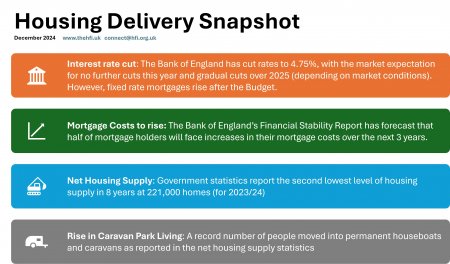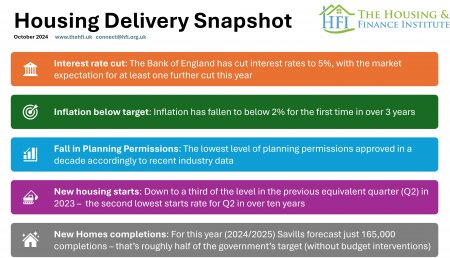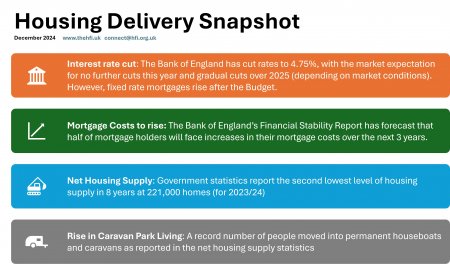

09 JAN 2018
Sir Mark Boleat: The Housing Problem in London - The Reaction
 Attempting to influence public policy is challenging at the best of times. Politicians inevitably have a short time horizon, seldom extending beyond the next election, and the principal objective of most is to be in power rather than to do anything with power. Over the last few years the situation has become more challenging through the combination of fake news and social media, such that facts and evidence play a lesser role in the policy-making process and perception plays a greater role. The effect becomes cumulative, as those seeking to influence policy have to concentrate on people's perceptions rather than substance, and by doing so they enhance the role that perceptions play. So every time a politician talks about the need to address concerns about the impact of immigration on health services so the perception that there is an issue to address increases. Some politicians and commentators do attempt to correct wrong perceptions, but sadly this can lead to a short political life.
Attempting to influence public policy is challenging at the best of times. Politicians inevitably have a short time horizon, seldom extending beyond the next election, and the principal objective of most is to be in power rather than to do anything with power. Over the last few years the situation has become more challenging through the combination of fake news and social media, such that facts and evidence play a lesser role in the policy-making process and perception plays a greater role. The effect becomes cumulative, as those seeking to influence policy have to concentrate on people's perceptions rather than substance, and by doing so they enhance the role that perceptions play. So every time a politician talks about the need to address concerns about the impact of immigration on health services so the perception that there is an issue to address increases. Some politicians and commentators do attempt to correct wrong perceptions, but sadly this can lead to a short political life.
Added to this phenomenon is the current combination of a weak government and the huge issue of Brexit, which at the same time is absorbing massive resources throughout government and business while failing to give the sense of direction and clarity that business needs.
It was against this background that I decided to seek to influence public policy on housing. My first foray in this field was in 1975 when I wrote Towards Freedom in Housing for the Bow Group. At the time the Bow Group was the Conservative think tank and the Conservatives were in opposition and were formulating their policies. The first sentence of the paper was "There is just one fundamental cause of the British housing problems – the government". The paper advocated a free market approach, reducing subsidies to home-owners and council tenants, freeing up the market for private rented housing and selling council houses to their tenants (40 years later, it is still necessary to explain that this does not reduce the stock of houses). This led to an invitation to work with Nigel Lawson to develop a policy for an incoming Conservative Government – which I duly did. A clear lesson here – timing and luck are vitally important in the policy-making process.
For 40 years I have continued to hold the view that the government is the cause of the housing problem, and my HFI paper sets out my reasoning. Rather than pandering to perceptions it concentrates wholly on evidence. So it rejects the notion that high house prices are caused by wicked developers land banking and by foreign buyers. There is no evidence to support either contention and ample evidence to the contrary. A principal problem is the planning system, which is far too heavily weighted towards existing residents.
What has been the reaction? Headlines in City Matters from a residents group demanding my resignation (I think from the City of London Planning Committee), and a (normally sensible) Labour spokesman saying "Out of order for boss of publicly-established body to attack affordable housing". And a tirade from a one-issue pressure group, which believes that its one issue transcends all others. (As an aside I am tempted establish a one-issue pressure group whose sole objective would be to abolish one issue pressure groups.)
But more importantly, and with little publicity, the paper has attracted the attention of policy makers and opinion formers. I have been asked to speak at meetings of two influential groups of housing practitioners, have spoken directly to government ministers and have been contacted by and subsequently met a number of organisations that are contributing to building more houses rather than trying to stop houses being built. I can't claim to have influenced the Budget announcements on housing but some are in the right direction and reflect HFI thinking more generally. So the issue is not land banking but rather why do developers need land banks (partial answer – because of the planning system), and what are reasons why it takes such a long time for planning permissions to be implemented (partial answer – the planning system).
A distinguished economist once said that if after five years on a government body you have managed to persuade it that price is influenced by the combination of supply and demand then you have achieved something. In my case my ambition is to convince policy makers that if the problem is that prices are too high the solution is not to increase demand by subsidising home-buyers but rather to remove constraints on supply.
To read Sir Mark's paper - The Housing Problem in London - click here.
May 2025 Housing Delivery Snapshot
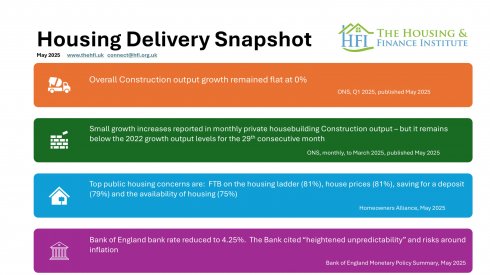
March 2025 Housing Delivery Snapshot
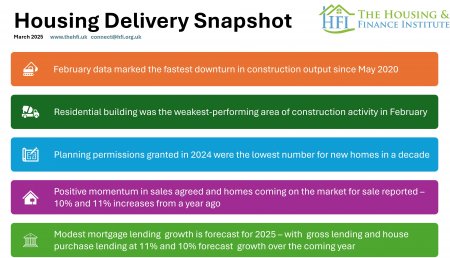
January 2025 Housing Delivery Snapshot

December 2024
